Blog 8
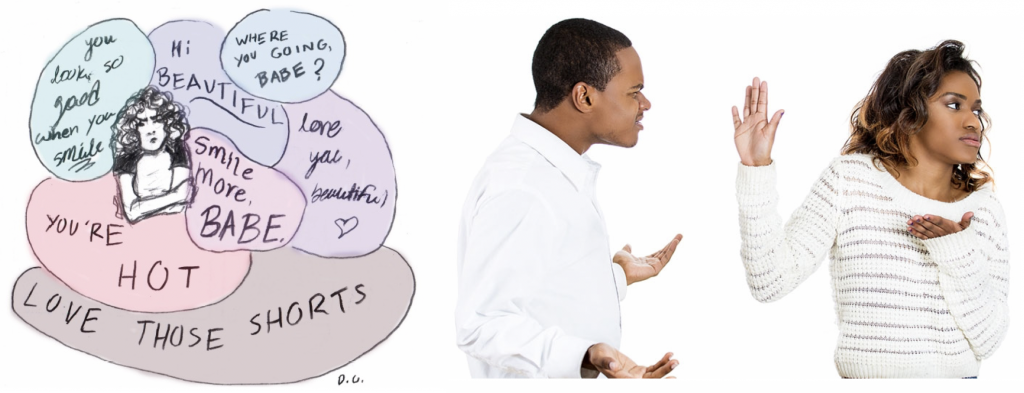
https://record.horacemann.org/2103/opinion/dismantling-the-stigma-creating-the-necessary-toolkit-to-deal-with-catcalling/
https://www.standardmedia.co.ke/entertainment/crazy-monday/2001317080/rejection-how-crazy-some-men-become-when-turned-down
I chose these two images because they represent the difference in responses that arise from catcalling. Women are rarely ever actually flattered from catcalling and are often uncomfortable or upset as a result. When women reject these calls or being hit on, some men get angry and act upon it.
DeWall’s article gave great insight on the role of sexual conflict in relationships. He did well describing the inherent motive behind heterosexual mating desires. It only makes sense that most men tend to be more emotionally removed from their family obligations as they have less of a physical connection with their children than women do. Therefore, men crave quantity while women crave quality. Regardless, it was interesting to realize how sexual conflict exists before, in the present, and after a relationship.
Also, sexual conflict is not just physical. Men and women upset each other in many different ways. Typically, women upset men by their lack of physical and sexual interest and response. They also anger men if they do not cater to or obey them. If a woman is confident, expressive, social, or engages in the same amount of sexual activity as men do, it upsets men. Based on my experiences and observations, men become upset when their ego and authority are challenged. Whether it be their sexual desire or verbal command, any counter to their perceived control angers them. Men upset women when they lack emotional vulnerability and contribution to a relationship. If they cannot communicate to their female partner or make any romantic gesture, it upsets women. When men come on too strong and assert their personas on women, it upsets them too. Another major trigger for both sexes is infidelity. If either sex flirts with another person and cheats on their partner, for the most part, it angers both sides equally.
Blog 7
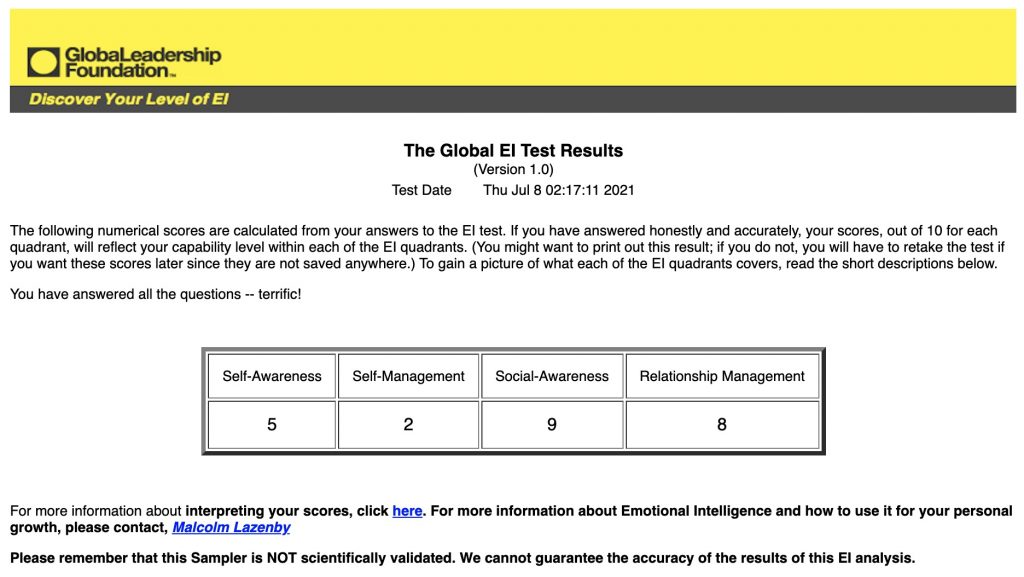
https://globalleadershipfoundation.com/geit/eitest.html
To me, our emotional intelligence is the ability for us to discern, evaluate, and adapt to our own and others’ emotions. These emotions directly affect our ability to self-regulate as self-regulation is our way of adapting to these emotions. After we identify an emotion and its reaction, we can adjust the way we act accordingly. Emotional Intelligence is a vital component to building relationships with others, as well as to live a fulfilling life. Growing up, I was taught and believed in the idea of “Treat others how you want to be treated.” To this day, I believe in it. I work a managerial role in food service, and there are a handful or rude customers. Sometimes I’ll let it slide, assuring myself they must be having a bad day or another excuse. However, certain customers who are rude or disrupt the environment of my store evoke a strong attitude from me. My emotional intelligence will sometimes allow me to calmly approach situations like this, but it will also recognize the overt emotions and mirror them back. I believe I could improve this by practicing the techniques in the video. I could take a step back, close my eyes, and breathe.
Blog 6
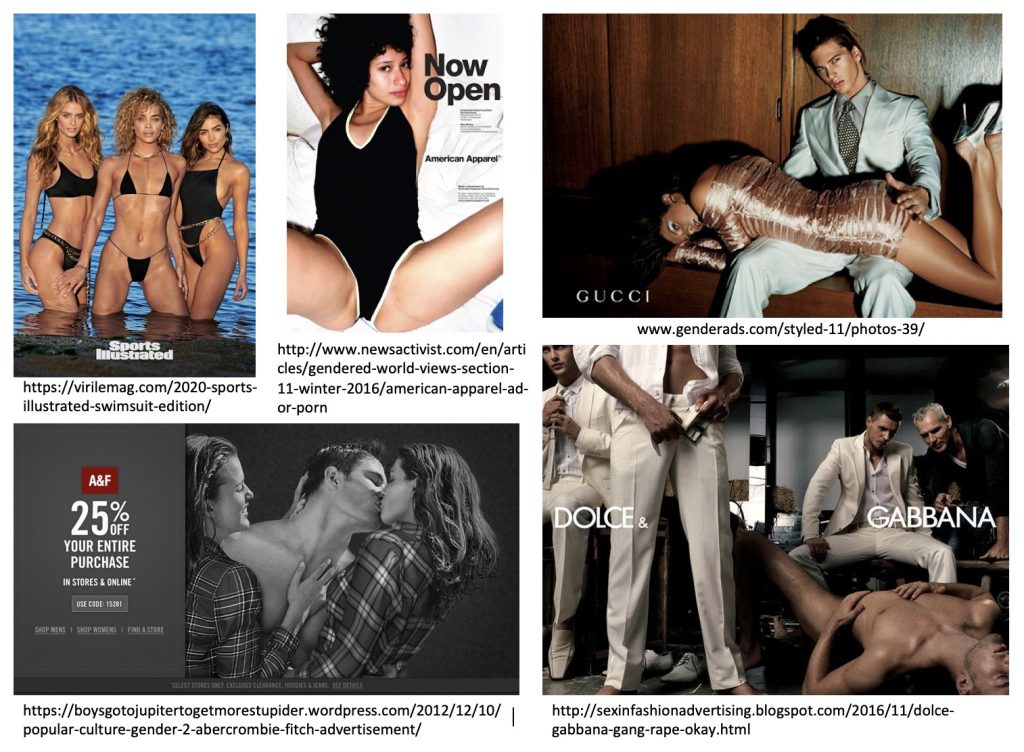
Jean Kilbourne’s did a wonderful job dissecting the sad reality of today’s world of advertisement. Especially with the development of the digital age, the means of advertising now treads on the border of pornography. Prior to this Ted Talk, I’ve noticed several sexist advertisements and commercials. Majority of the ones I recall were when I was a child, a time where people were able to get away with discriminatory remarks and jokes. Women were always sexualized, modeled nude or in suggestive ways to promote something as mundane as a burger. I never thought much of it, although I always thought it was weird and uncomfortable. However, recently it has come to my attention the effect these ads have on societal behavior. These advertisements normalize the objectification of women and promote the progression of degradation. I read a thread on Twitter that discussed how violent pornography contributes to violent sexual crimes against women. Much like the advertisements, pornography portrays a false expectation of women and their desires. Most pornography and ads are created with a male gaze, tailored to straight male desires and the perception that women share the same interests. This encourages men to act upon these ideas and target women. This Ted Talk further solidified my belief in that theory.
The five ads I chose above were ones I recall seeing in magazines and online when I was in middle and high school. Media censorship and standards were still in development, so I definitely saw things I shouldn’t have when I was younger. However, this is what was targeted towards the general public for everyone to see. I remember being confused about Sports Illustrated magazines, as the covers weren’t about sports but rather conventionally attractive and fit women. These magazines are obviously tailored to men as they cover partially nude women on a sports magazine. The next image was an ad for American Apparel, a well-sought indie clothing brand during the mid 2010s. Although they did portray more natural bodies sans photoshop, they contributed to the oversexualization of women’s bodies. “Now Open” with the model’s legs spread open is highly suggestive and using sex to sell their products. It suggests that any women with open legs is simply “asking for it.” Gucci is definitely guilty for their numerous objectifying photoshoots. This ad encourages the idea that women should be and are submissive. The A&F ad encourages the narrative that men pursuing multiple women is seen as attractive, but if the roles were reversed the women would be seen as used. Also, this ad sexualizes lesbian or bisexual relationships as only being seen as sexual relationships. This correlates with the final image, the Dolce & Gabbana ad. Although Kilbourne emphasizes that men do not experience the threat that women do, I believe that queer or gay men experience the same prejudice to an extent. They do have the privilege of being a man, but queer or gay men are often perceived as feminine or “less of a man.” This coincides with the belief that women are inferior and can be used like sex objects.
Blog 4
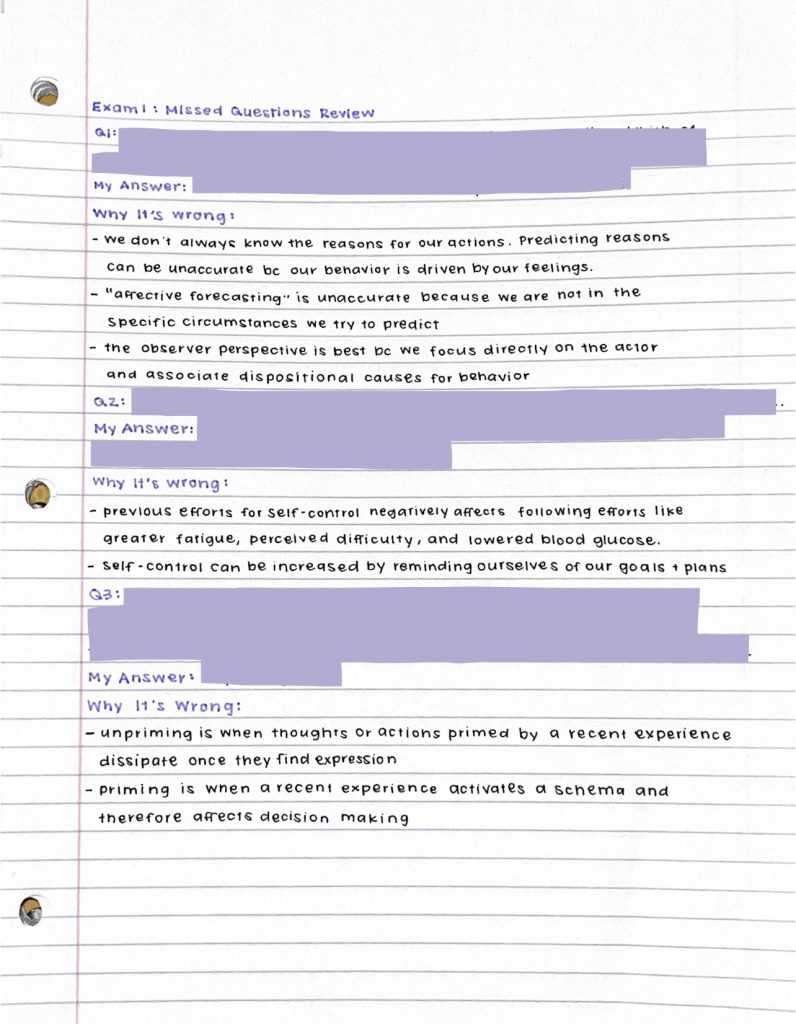
Copy of my “Missed Questions Review Sheet”. I have blocked out the questions and answers from my test review. The question numbers are just the amount of questions I missed and do not correlate with the actual question numbers I missed on my exam. I’ve used this method since I started college, and it has helped me to review and recall information from courses very easily.
I did surprisingly well on my first exam despite being very nervous for it and only missed three questions. Something I’ve always done for quizzes and exams is review the questions I have missed in a certain format, so I was glad to see this as my prompt for a blog post. This way, I am strengthening the connections between my brain and the information I missed through explanation and repetition. I always write down the question I have missed along with my incorrect answer and the correct answer. This is so I can clearly differentiate and understand why my way of thinking was incorrect. In this instance, I don’t have access to the multiple choice answers, so I did not include the correct answers here. However, I always follow the answers with an explanation from my notes, powerpoint presentations, or textbooks that show the reason why my answer was incorrect. I did go back and highlight and write side notes in my notebook for the concepts that I should aim to remember and comprehend that I didn’t on the exam. The review sheet, jeopardy videos, and quizzes in the textbook chapters were a big help in studying for the exam. Now that I know what works best for me to study and prepare myself for this course’s exams, I believe I will be more confident and attentive when it comes to the next two exams for this course and other classes as well.
Blog 2
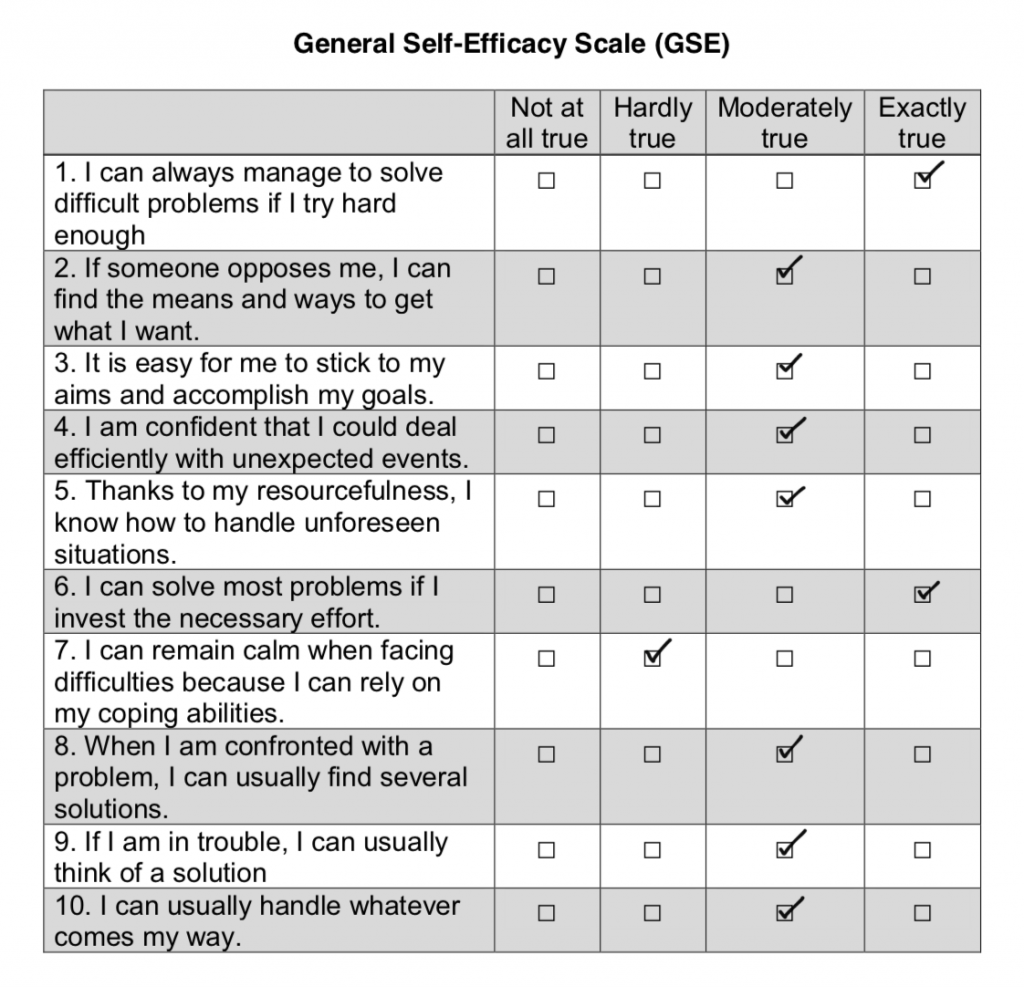
Copy of my General Self-Efficacy results. I would’ve put “Exactly True” for several of the questions I selected “Moderately True” for, but I realistically know I would not feel that way for every situation. My remarks and grades reflect the effort I put into my work, but I lack the confidence that would usually be associated with them.
Currently, I believe myself to be a hard-working student who’s trying their best despite sometimes falling short of their responsibilities. Attending school online for over a year now has taken its toll on my work ethic. I learn best when I experience material and lessons in person where I am forced to focus on what is in front of me. Since moving to online courses, my confidence in the classroom has recognizably decreased as I am easily distracted. However, I still make an effort to give myself credit where it is due.
I associate my success with my grades as they are a reflection of my knowledge and learning capabilities. I often self-promote myself in social situations in order to appear confident and educated to others. Unfortunately, alone, I see my work as sufficient and sometimes subpar. I will receive good grades and praise for my work, but my self-deprecation convinces myself that I could always do better. Perhaps this is because I was raised in an Asian household where this environment convinces me that excellence is preferred rather than effort and sufficiency. As I’ve aged, I’ve learned to create my own mindset that my work is much better than I believe it to be in an effort to raise my confidence and self-esteem.
Surprisingly, on the General Self-Efficacy Scale, I scored a 31 or an average of 3.1, which is slightly higher than the average. I possess a relatively normal sense of self-efficacy, which I believe to be true. I am able to create and fulfill goals that I set for myself but still encounter doubts and obstacles getting there that may hold me back. Majority of the time I believe I can accomplish anything I put my mind to, but I realistically understand that there are times where I many not able to do so. As a result of this I tend to underestimate my abilities and it often shows in my work.
Blog 1
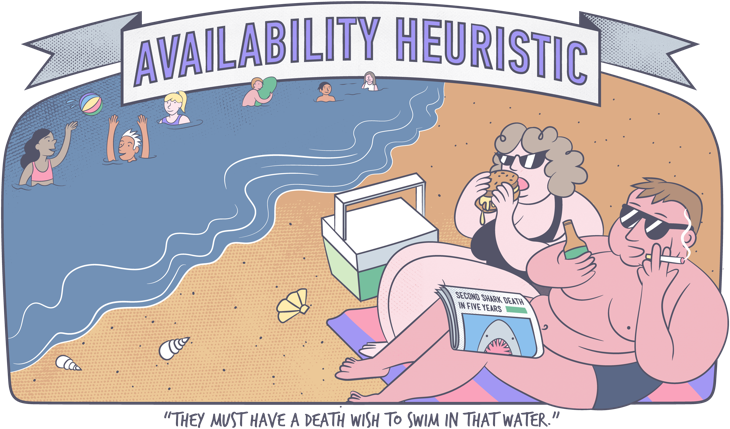
https://ritholtz.com/2016/05/10-cognitive-biases-that-affect-your-everyday-decisions/availability-heuristic/
The image portrays a couple exhibiting the availability heuristic when making assumption about the people in the water. The man’s newspaper headlines the “second shark death in five years”. Using their limited knowledge of the shark attack, they claim the people must have a death wish as they are potentially swimming in shark-infested waters. They make this claim despite eating fast food, drinking alcohol, and smoking cigarettes, all of which could be considered a death wish as well.
With the projected course objectives, this class will help me to establish and further build relationships with others, especially patients. As a future nurse, not only is it my job to take care of patients physically, but verbally and emotionally. By understanding perception, cognitive behavior, and how we make connections, I will be able to do so. From this course I’m hoping to gain a deeper understanding of human connection and communication. This will help me establish a welcoming and caring environment for my patients, but also develop meaningful connections with the others around me. I have a master list I create each semester that organizes my assignments for all my classes each week. Since I’m only taking several classes this semester, I plan to organize my week as follows:
Monday/Tuesday: read material and take notes for the week’s topic
Wednesday/Thursday: summarize information for better comprehension, begin/complete any assignments
Friday – Sunday: finalize all assignments and submit